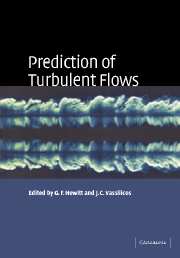Book contents
- Frontmatter
- Contents
- 1 Introduction
- 2 Developments in the understanding and modelling of turbulence
- 3 RANS modelling of turbulent flows affected by buoyancy or stratification
- 4 Turbulent flames
- 5 Boundary layers under strong distortion: an experimentalist's view
- 6 Turbulence simulation
- 7 Computational modelling of multi-phase flows
- 8 Guidelines and criteria for the use of turbulence models in complex flows
1 - Introduction
Published online by Cambridge University Press: 12 August 2009
- Frontmatter
- Contents
- 1 Introduction
- 2 Developments in the understanding and modelling of turbulence
- 3 RANS modelling of turbulent flows affected by buoyancy or stratification
- 4 Turbulent flames
- 5 Boundary layers under strong distortion: an experimentalist's view
- 6 Turbulence simulation
- 7 Computational modelling of multi-phase flows
- 8 Guidelines and criteria for the use of turbulence models in complex flows
Summary
Background
In 1999, a major programme on turbulence was held at the Isaac Newton Institute (INI) at Cambridge, England, which was aimed at taking an overview of the current situation on turbulent flows with particular reference to the prediction of such flows in engineering systems. Though the programme spanned the range from the very fundamental to the applied, a very important feature was the involvement and support (through the UK Royal Academy of Engineering) of key players from industry. This volume, which has evolved from the INI programme, aims to address the needs of people in industry and academia who carry out calculations on turbulent systems.
It should be recognised that the prediction of turbulent flows is now of paramount importance in the development of complex engineering systems involving flow, heat and mass transfer and chemical reactions (including combustion). Whereas, in the past, the developer had to rely on experimental studies, based usually on small scale model systems, more and more emphasis is being placed nowadays on the use of computation, often through the use of commercial computational fluid dynamics (CFD) codes. Superficially, the use of such computational methods seems ideal; they allow painless extension to large scale and can often give information on fine details of the flow that are not economically accessible to experimental measurement. Furthermore, the results can be presented in an easily accessible and attractive form using the sophisticated computer graphics now generally available.
Information
- Type
- Chapter
- Information
- Prediction of Turbulent Flows , pp. 1 - 4Publisher: Cambridge University PressPrint publication year: 2005
